I'm currently using Ionic CLI 3.19 with Cordova CLI 7.1.0 (@ionic-app-script 3.1.4)
The problem that I’m currently facing with is, I should update friends node values simultaneously every time the related data get changed from elsewhere. I’d like to clarify my objective with some screenshots to make it more clear.
As you can see from the image below, each child node consists of a user array that has a user id as a key of friends node. The reason why I store as an array is because each user could have many friends. In this example, Jeff Kim has one friend which is John Doe vice versa.
When data in users node gets changed for some reason, I want the related data in friends node also want them to be updated too.
For example, when Jeff Kim changed his profile photo or statusMessage all the same uid that reside in friends node which matches with Jeff Kim’s uid need to be updated based on what user has changed.
user-service.ts
constructor(private afAuth: AngularFireAuth, private afDB: AngularFireDatabase,){
this.afAuth.authState.do(user => {
this.authState = user;
if (user) {
this.updateOnConnect();
this.updateOnDisconnect();
}
}).subscribe();
}
sendFriendRequest(recipient: string, sender: User) {
let senderInfo = {
uid: sender.uid,
displayName: sender.displayName,
photoURL: sender.photoURL,
statusMessage: sender.statusMessage,
currentActiveStatus: sender.currentActiveStatus,
username: sender.username,
email: sender.email,
timestamp: Date.now(),
message: 'wants to be friend with you.'
}
return new Promise((resolve, reject) => {
this.afDB.list(`friend-requests/${recipient}`).push(senderInfo).then(() => {
resolve({'status': true, 'message': 'Friend request has sent.'});
}, error => reject({'status': false, 'message': error}));
});
}
fetchFriendRequest() {
return this.afDB.list(`friend-requests/${this.currentUserId}`).valueChanges();
}
acceptFriendRequest(sender: User, user: User) {
let acceptedUserInfo = {
uid: sender.uid,
displayName: sender.displayName,
photoURL: sender.photoURL,
statusMessage: sender.statusMessage,
currentActiveStatus: sender.currentActiveStatus,
username: sender.username,
email: sender.email
}
this.afDB.list(`friends/${sender.uid}`).push(user);
this.afDB.list(`friends/${this.currentUserId}`).push(acceptedUserI
this.removeCompletedFriendRequest(sender.uid);
}
According to this clip that I've just watched, it looks like I did something called Denormalization and the solution might be using Multi-path updates to change data with consistency. Data consistency with Multi-path updates. However, it's kinda tricky to fully understand and start writing some code.
I've done some sort of practice to make sure update data in multiple locations without calling .update method twice.
// I have changed updateUsername method from the code A to code B
// Code A
updateUsername(username: string) {
let data = {};
data[username] = this.currentUserId;
this.afDB.object(`users/${this.currentUserId}`).update({'username': username});
this.afDB.object(`usernames`).update(data);
}
// Code B
updateUsername(username: string) {
const ref = firebase.database().ref();
let updateUsername = {};
updateUsername[`usernames/${username}`] = this.currentUserId;
updateUsername[`users/${this.currentUserId}/username`] = username;
ref.update(updateUsername);
}
I'm not trying to say this is a perfect code. But I've tried to figure this out on my own and here's what I've done so far.
Assume that I'm currently signed in as Jeff.
When I run this code all the associated data with Jeff in friends node gets changed, as well as Jeff's data in users node gets updated simultaneously.
The code needs to be improved by other firebase experts and also should be tested on a real test code.
According to the following thread, once('value' (which is, in general, a bad idea for optimal performance with Firebase). I should find out why this is bad.
friend.ts
getFriendList() {
const subscription = this.userService.getMyFriendList().subscribe((users: any) => {
users.map(u => {
this.userService.testMultiPathStatusMessageUpdate({uid: u.uid, statusMessage: 'Learning Firebase:)'});
});
this.friends = users;
console.log("FRIEND LIST@", users);
});
this.subscription.add(subscription);
}
user-service.ts
testMultiPathStatusMessageUpdate({uid, statusMessage}) {
if (uid === null || uid === undefined)
return;
const rootRef = firebase.database().ref();
const query = rootRef.child(`friends/${uid}`).orderByChild('uid').equalTo(this.currentUserId);
return query.once('value').then(snapshot => {
let key = Object.keys(snapshot.val());
let updates = {};
console.log("key:", key);
key.forEach(key => {
console.log("checking..", key);
updates[`friends/${uid}/${key}/statusMessage`] = statusMessage;
});
updates[`users/${this.currentUserId}/statusMessage`] = statusMessage;
return rootRef.update(updates);
});
}
The code below works fine when updating status to online but not offline.
I don't think it's the correct approach.
updateOnConnect() {
return this.afDB.object('.info/connected').valueChanges()
.do(connected => {
let status = connected ? 'online' : 'offline'
this.updateCurrentUserActiveStatusTo(status)
this.testMultiPathStatusUpdate(status)
})
.subscribe()
}
updateOnDisconnect() {
firebase.database().ref().child(`users/${this.currentUserId}`)
.onDisconnect()
.update({currentActiveStatus: 'offline'});
this.testMultiPathStatusUpdate('offline');
}
private statusUpdate(uid, status) {
if (uid === null || uid === undefined)
return;
let rootRef = firebase.database().ref();
let query = rootRef.child(`friends/${uid}`).orderByChild('uid').equalTo(this.currentUserId);
return query.once('value').then(snapshot => {
let key = Object.keys(snapshot.val());
let updates = {};
key.forEach(key => {
console.log("checking..", key);
console.log("STATUS:", status);
updates[`friends/${uid}/${key}/currentActiveStatus`] = status;
});
return rootRef.update(updates);
});
}
testMultiPathStatusUpdate(status: string) {
this.afDB.list(`friends/${this.currentUserId}`).valueChanges()
.subscribe((users: any) => {
users.map(u => {
console.log("service U", u.uid);
this.statusUpdate(u.uid, status);
})
})
}
It does show offline in the console, but the changes do not appear in Firebase database.
Is there anyone who could help me? :(


